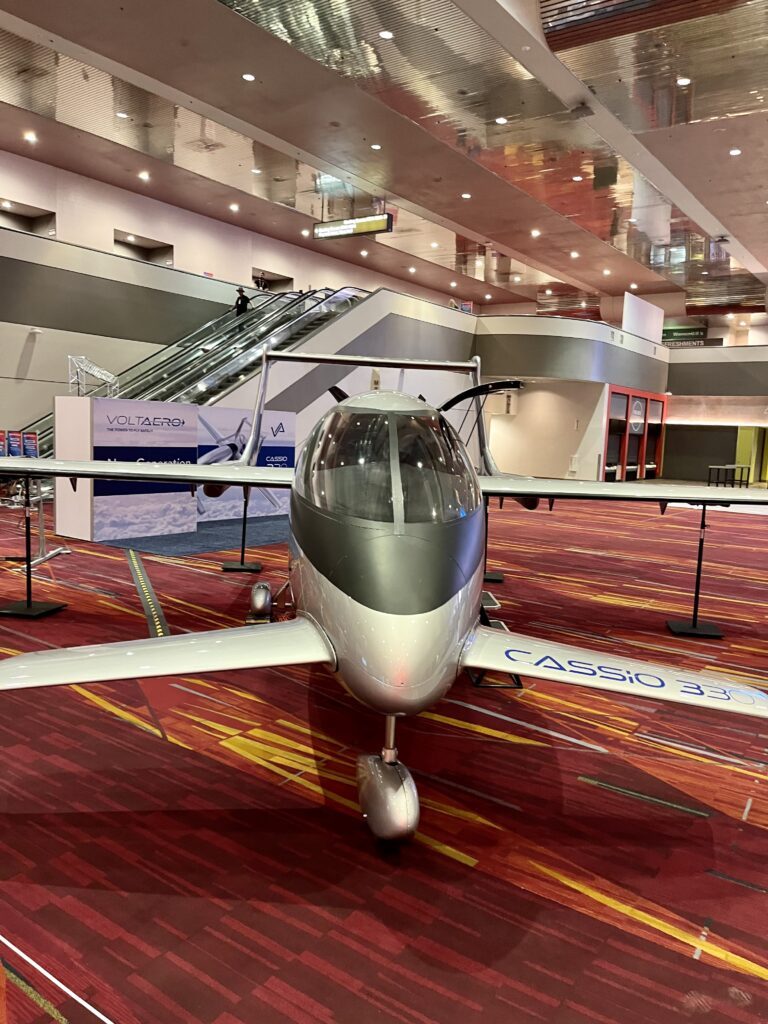AAM and Drones Are Climbing Fast with NBAA
At this year’s National Business Aviation Association (NBAA) Business Aviation Conference and Expo (BACE) in fabulous Las Vegas, the organization doubled-down on its commitment to sustainability by announcing a new public advocacy campaign, “Climbing.Fast.” From the Keynote stage on Day 1, NBAA President and CEO, Ed Bolan, confirmed that his team “seeks to underscore all the great things about business aviation and to make clear that we are on a mission to net zero.” From the stage to the event branding, across the expo hall floor and out at the electric vertical takeoff and landing (eVTOL) live demonstrations out at Henderson’s Executive Airport, NBAA made another message just as loud and clear: drones and air taxis are part of the sustainability solution for business aviation (BA).
In its Business Aviation Fact Book, NBAA defines BA as “a subset of general aviation (GA)” that uses such aircraft “for business purposes.” GA “encompasses all civil aviation activity except that of the commercial airlines” and “is an integral and vital part of the world’s transportation system.” Until recently, BA only included helicopters, piston-powered propeller-driven airplanes and turbine-powered turboprops and turbojets. Now, with zero net emissions as its target, NBAA has embraced drones and air taxis as part of its broader ecosystem.
Bolan explained that among other things, NBAA has been, “fostering new technologies such as hybrid, hydrogen, electric propulsion.” He said, “We are moving into the AAM (advanced air mobility) age.” Referencing Wisk’s 5th generation demonstrator autonomous eVTOL aircraft, Cora, he called out the “aircraft in our lobby that flew at OshKosh this year.” He exclaimed in front of the standing-room-only keynote crowd, “This is happening!”
In addition to the Cora, other companies also showcased their air taxis. VoltAero showcased its Cassio, an industry-first electric-hybrid aircraft that uses sustainable fuel made with bioethanol from vineyard waste. Electra Aero displayed a model of its hybrid-electric, ultra-short takeoff and landing (eSTOL) aircraft. It has plans to carry nine passengers, two pilots, and 50 lbs of baggage per person over 400 nautical miles. And, every morning at the show, Volocopter provided live demonstration flights of its VoloCity prototype before crowds watching in awe as the future of aviation flew before their very eyes.
And then there were the drones. USI (formerly known as Unmanned Safety Institute), in partnership with Sony, Censys Techologies and Phoenix Air Unmanned (PAU), displayed drone technology and training programs to the throngs of conference attendees who explored the Emerging Tech pavilion.
For the first time in the history of the event, educational content included panels not only on the future of AAM but also on beyond visual line of sight (BVLOS) drone operations and drone enabling technologies. Comprised of some of the drone’s industry’s luminaries, such as Josh Olds from USI, Jon Damush of Iris Automation, Charlton Evans CEO of End State Solutions, Will Lovett of PAU, Rob Knochenhauer of Censys, among others, these panels helped further build the bridge between the traditional GA/BA crowd and these newer entrants to the community. To reinforce the point that this new wave of aircraft are an essential part of BA, and are here to stay, even the NBAA event banners and slides included images of drones.
“Sustainability is a huge focus of the event and for business aviation now and into the future,” Bolan noted. He continued, “We have been an incubator for new tech. We have reduced carbon emissions by 40%. We are champions of sustainable aircraft fuel, which can reduce emissions by 80%….We are excited about the remarkable technologies, products and services on display here at the Expo Center and out at Henderson Airport.”
BA has created over a million jobs, fostered economic development in small towns and communities and connected them to the global marketplace. BA makes companies more efficient by allowing them to connect to three cities in one day. And BA further helps society by routinely providing humanitarian relief.
BA is not going away. It has a story to tell. And now, drones and air taxis are part of that story.
Dawn M.K. Zoldi (Colonel, USAF, Retired) is a licensed attorney with 28 years of combined active duty military and federal civil service to the U.S. Air Force. She is the CEO & Founder of P3 Tech Consulting and an internationally recognized expert on uncrewed aircraft system law and policy. Zoldi contributes to several magazines and hosts popular tech podcasts. Zoldi is also an Adjunct Professor for two universities, at the undergraduate and graduate levels. In 2022, she received the Airwards People’s Choice Industry Impactor Award, was recognized as one of the Top Women to Follow on LinkedIn and listed in the eVTOL Insights 2022 PowerBook. For more information, follow her on social media and visit her website at: https://www.p3techconsulting.com.
Miriam McNabb is the Editor-in-Chief of DRONELIFE and CEO of JobForDrones, a professional drone services marketplace, and a fascinated observer of the emerging drone industry and the regulatory environment for drones. Miriam has penned over 3,000 articles focused on the commercial drone space and is an international speaker and recognized figure in the industry. Miriam has a degree from the University of Chicago and over 20 years of experience in high tech sales and marketing for new technologies.For drone industry consulting or writing, Email Miriam.
TWITTER:@spaldingbarker
Subscribe to DroneLife here.

